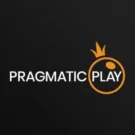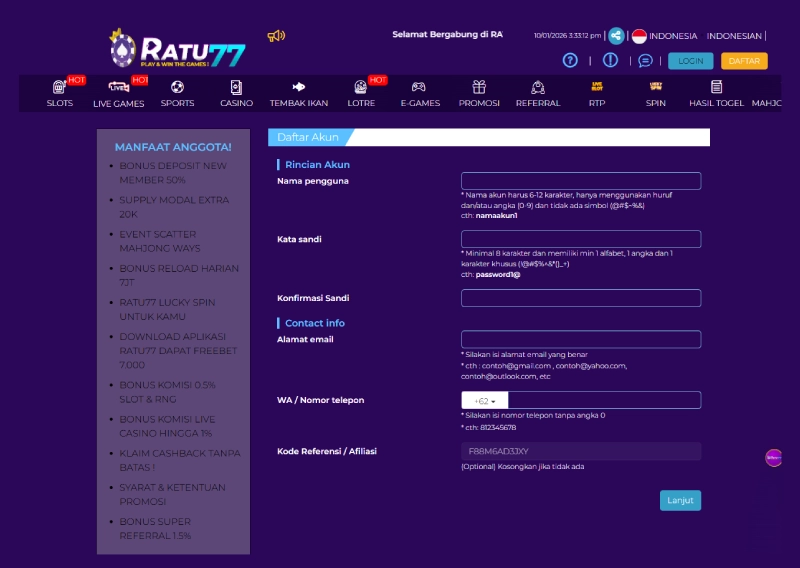RATU77 – Situs Judi Online Terpercaya Indonesia
RATU77 adalah situs judi online terpercaya dengan live casino yang memiliki baccarat, roullete, sicbo dan blackjack di Indonesia.
Dibawah ini tersedia dua link untuk daftar, login, bermain, maupun klaim promosi.

Bonus Up To: Rp. 500.000 Dengan Turn Over x7, Minimal Deposit Rp. 50.000
Rebate Live Casino 0.7% Dengan Minimal Bonus Rp. 5.000

SIAPA RATU77?
RATU77 merupakan sebuah situs judi online yang pertama kali berdiri pada tahun 2023 dengan tujuan memberikan hiburan berupa permainan taruhan live casino dengan target pasar asia pasifik seperti Indonesia, Vietnam, dan Thailand.
Merek kami memiliki misi menyediakan layanan terbaik di Asia dengan kualitas tertinggi di permainan live casino online yang tidak mudah untuk anda cari di Asia terutama di Indonesia. langsung daftarkan diri anda bersama kami, dan mainkan permainan terbaik anda bersama RATU77.


DAFTAR PROMOSI MENARIK
Disini anda bisa mendapatkan promosi menarik mulai dari bonus member baru hingga reload bonus harian yang bisa diklaim setiap hari tanpa batas waktu! langsung cek promosi dibawah ini.

APA SAJA YANG TERSEDIA DI RATU77
Di RATU77, pemain bisa mendapatkan permainan live casino yang berkualitas dan sudah banyak dikenal oleh pemain di Asia terutama dari Indonesia seperti, Baccarat, Blackjack, Roulette, Sic-Bo, Dragon Tiger dan Poker. semua permainan ini menggunakan produk dari penyedia yang sudah terverifikasi dan terjamin aman untuk dimainkan. silahkan nikmati permainan dari kami dibawah ini.




Mengapa Anda Harus Memilih RATU77?
Apa yang membuat RATU77 sangat percaya diri dalam menawarkan produk permainan live casino online, tentu saja ada kelebihan-kelebihan yang tidak bisa anda temukan di tempat bermain lainnya, kami sangat menjaga kualitas permainan kami dan juga pelayanan yang diberikan guna meningkatkan kepercayaan para pemain serta rasa nyaman ketika menikmati produk live casino.
- Kualitas Permainan Di RATU77. Kami selalu menjaga kualitas permainan dengan memastikan semua permainan selalu lancar ketika dimainkan, selain itu juga keadilan dalam bermain adalah hal yang juga diperhatikan guna memastikan bahwa pemain kami akan selalu merasa nyaman ketika bermain, karena dasarnya dari live casino online yang ditawarkan adalah berbentuk hiburan online sehingga tidak dianggap merugikan pihak manapun.
- Tampilan Permainan RATU77. Kami bekerja sama dengan penyedia produk permainan live casino online terbaik di dunia, tentu saja tampilan dari permainan sangat mudah untuk dipahami setiap pemain, video streaming permainan live casino kami juga selalu kami perhatikan guna meminimalisir terjadinya kesalahan teknis ketika sedang berjalan.
- Pelayanan Di Situs RATU77. RATU77 memiliki layanan yang tidak bisa diragukan, kami mengutamakan layanan sopan, cepat tanggap dan efisien dalam segala hal. salah satu contohnya adalah waktu dalam memproses deposit dan penarikan, disini kami menyeleksi setiap staff dengan baik dan memberikan pelatihan yang berat guna untuk bisa menghasilkan layanan terbaik untuk para member setia kami.
- Promosi di RATU77. Bisa anda lihat bahwa di situs RATU77 selalu ada promosi baru berupa bonus-bonus besar, mudah di klaim dan adanya hadiah-hadiah menarik yang bisa dimenangkan oleh setiap pemain yang baru mendaftar atau pun member loyal kami. pihak pengelola selalu berusaha memunculkan ide-ide baru guna memberikan promosi menarik setiap bulan kepada pemain kami.
- Fitur Yang Tersedia. RATU77 memiliki situs judi online modern yang memiliki fitur-fitur terbaru yang selalu ditambah, contohnya, kami memiliki fitur aplikasi yang bisa anda download dan anda mainkan dalam versi yang lebih ringan untuk ponsel pintar anda, dan fitur ini tersedia untuk pengguna ponsel pintar bersistem operasi iOS dan Android yang bisa didownload hanya dengan scan barcode yang tersedia. selain itu ada juga fitur-fitur menarik lainnya yang tidak boleh anda lewatkan.
Setiap informasi yang kami berikan kepada member juga sangat membantu member untuk selalu tahu dan mengikuti update setiap perkembangan dari situs RATU77, anda bisa mendapatkan broadcast pesan terkait promosi serta permainan-permainan terbaru kami lewat pesan singkat di nomor telepon anda.


Bonus Deposit New Member 50%

Bagaimana Cara Mendaftarkan Diri Di RATU77?

Anda bisa klik salah satu tombol daftar yang tersedia di halaman ini, kemudian anda akan masuk ke situs utama RATU77 dan klik menu register atau daftar, anda akan langsung mendarat di halaman pendaftarn kami, kemudian isi data diri anda yang jelas dan kirimkan form pendaftaran kami.
Kesimpulan RATU77
RATU77 adalah sebuah merek judi online dengan permainan live casino yang paling lengkap di Asia, dan terkenal memiliki situs yang mudah diakses karena tersedia banyak link alternatif, update menarik setiap bulan, permainan berkualitas dan layanan terbaik, sehingga pemain akan sangat nyaman ketika bermain disini.
Anda juga tidak perlu menghawatirkan keamanan data diri anda ketika mendaftar di RATU77, kami berkomitmen untuk mejaga segala hal privasi anda termasuk data diri dan juga setiap transaksi yang anda lakukan disini akan selalu menjadi rahasia kami.
Mencari situs judi online dengan harga permainan terjangkau namun kualitas Internasional? cuman di RATU77 saja, anda bisa mendapatkan permainan berkualitas, serta layanan yang tidak bisa anda dapatkan di tempat lainnya. segera daftarkan diri anda, klaim promosi bonus deposit dari kami dan mainkan live casino terbaik!
FAQ (Pertanyaan Yang Sering Diajukan)
RATU77 adalah situs judi online terpercaya dengan live casino yang memiliki baccarat, roullete, sicbo dan blackjack di Indonesia.
Anda bisa klik salah satu tombol daftar yang tersedia di halaman ini, kemudian anda akan masuk ke situs utama kami dan klik menu register atau daftar, anda akan langsung mendarat di halaman pendaftaran kami, kemudian isi data diri anda yang jelas dan kirimkan form pendaftaran kami.
Tentu saja pihak RATU77 tidak mengizinkan hal tersebut, karena setiap individu disini hanya diperbolehkan memiliki 1 akun saja, jika kedapatan anda memiliki lebih dari 1 akun, maka akun anda yang lain akan kami hapus dan setiap dana yang tersisa di akun tersebut akan hangus.
Minimal deposit di situs kami adalah seharga Rp. 10.000 saja, anda bisa melakukan deposit dengan harga terjangkau dan proses deposit kami juga hanya memerlukan waktu hitungan detik saja.
Minimal deposit adalah seharga Rp. 10.000 saja, anda bisa melakukan deposit dengan harga terjangkau dan proses deposit kami juga hanya memerlukan waktu hitungan detik saja.
Harga Minimal di setiap permainan yang tersedia berbeda-beda, dimulai dari harga Rp. 1.000, anda sudah bisa memainkan permainan baccarat, sicbo, roulette, blackjack dan permainan lain yang tersedia.
Permainan yang paling populer dan banyak dimainkan adalah live casino, tepatnya permainan baccarat, karena hampir semua pemain Indonesia mengerti apa itu baccarat dan bagaimana cara memainkannya, akan sangat mengasikkan jika anda bermain dalam jangka waktu yang panjang.
Kami memproses waktu penarikan anda hanya dalam hitungan menit. proses tersebut mencakup pengecekan saldo di akun anda, dan verifikasi akun rekening anda guna menghindari kesalahan dari transaksi yang kami lakukan.
Metode transaksi yang tersedia berupa transaksi menggunakan bank lokal, E-Wallet, dan Qris.
Tersedia promosi seperti BONUS DEPOSIT NEW MEMBER 50%, SUPPLY MODAL EXTRA 20K, BONUS RELOAD HARIAN 7JT, dan beberapa promosi menarik lainnya yang bisa anda lihat langsung di situs utama RATU77.
*Permainan di situs RATU77 hanya dikhususkan untuk pemain yang berusia diatas 18 tahun, dan kami sangat menyarankan anda untuk bermain dengan tanggung jawab, batasi setiap taruhan anda, karena pada dasarnya permainan judi online adalah hiburan diperuntukkan kepada individu yang sudah mencukupi umur serta tidak untuk menjadi mata pencaharian utama anda.







